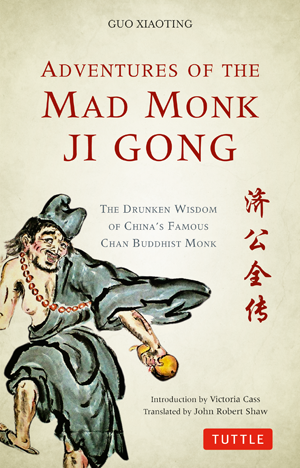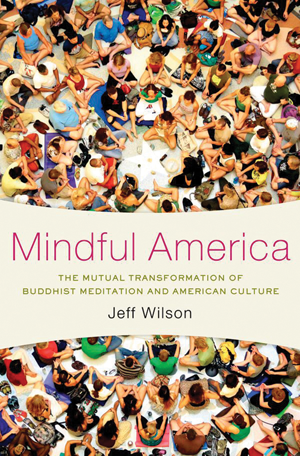
The Yoga Sutra of Patanjali (Princeton University Press, June 2014, $24.95, 288 pp., cloth) undertakes an exhaustive, scholarly history of the titular work of ancient Indian philosophy, lightened by author David Gordon White’s provocative wit. White begins in disbelief over why many modern-day yoga teacher training courses require students to study the sutra. “This [phenomenon] is curious to say the least,” he observes, “given the fact that the Yoga Sutra is as relevant to yoga as it is taught and practiced today as understanding the workings of a combustion engine is to driving a car.” White’s early remark will dispel any reader’s expectation of mundane scholarship.
The Yoga Sutra—compiled in the early centuries of the Common Era and attributed to Patanjali (about whom virtually nothing is known)—is made up of 195 aphorisms that provide a comprehensive account of consciousness and a short guide for realization in one’s own life. For White, the millennia-old story of this opaque document involves a series of fits and starts, as the sutra caromed from prestige to near-oblivion to triumphant revival. The ultimate irony of the story is that the Yoga Sutra secured its place in posterity only after the British Orientalist Henry Thomas Colebrooke penned the first English language study mentioning the sutra, or in White’s words, “freed [it] from its Indian moorings.”
White delivers a captivating, though at times esoteric, history of the Yoga Sutra, which he says has withstood a process akin to judicial review. Disputes over the original intent of the work are far older and more varied than those regarding the US Constitution, stretching from ancient commentators to 11th-century Muslim theologians to German Romantics to Theosophists and finally to today’s yoga instructors. White’s in-depth examination demonstrates how scriptural exegesis often reveals as much about the worldview and priorities of its authors as it does the wisdom of the works they interpret.

Readers may be familiar with Han Shan, the 9th-century wandering Chinese monk and author of Cold Mountain Poems, translated by Gary Snyder in the 1950s and made famous by mention in Jack Kerouac’s The Dharma Bums. If Han Shan was a rogue Buddhist of the rural variety, then Ji Gong was his 12th-century urban counterpart. The latter gregariously wandered from the monastery to the slums to the houses of noblemen, never far from a jug of wine or two. His playful, instructive meanderings make up Adventures of the Mad Monk Ji Gong (Tuttle Publishing, August 2014, $22.95, 542 pp., paper), which appears here in English for the first time, translated by John Robert Shaw and broken up into 89 short prose chapters interspersed with rich verse.
In her introduction, the scholar and lecturer Victoria Cass describes the oral transmission of Ji Gong’s stories, which occurred not in temples but in taverns: “It was claimed by generations of city dwellers—900 years of entertainers and the entertained—who seized on this tale of defiance and trickster humor.” It wasn’t until the late 19th century that Guo Xiaoting wrestled those performances onto the page, a daring act of insurrection in Beijing, whose citizens suffered under the censorship of the late Qing Dynasty. Xiaoting made Ji Gong topical and potent, reimagining him not only as a comic hero but as a Robin Hood figure who challenged institutional norms and assisted the poor.
If this new version has it right, Ji Gong did certainly have an uncanny knack for entangling himself in other people’s business. Descriptive chapter titles hint at the wide-ranging tone of these 89 linked vignettes, from didactic (“When sympathetic friends meet, kindness is repaid with kindness; resentment cherished in the heart of an inferior man brings grievous injury”) to magical (“Sorcerer Hua weaves his spell; the Chan master comes from the Iron Buddha Temple to save those in need”) to banal (“The prefect sends out his men; Ji Gong goes with the magistrate to pay a social call”).

Though a relatively slim volume bearing an ordinary title, Jeff Wilson’s Mindful America (Oxford University Press, August 2014, $29.95, 272 pp., cloth) provides a significant contribution to religious studies by examining the origins and growth of the mindfulness phenomenon in the United States. Wilson traces the craze back to the inception of lay meditation in 19th-century Southeast Asia, then recounts the practice’s rising popularity among American Buddhists in the 20th century and its explosion into the cultural mainstream in the early 21st. The remaining chapters detail a handful of the mindfulness trend’s salient features: its claims to scientific legitimacy and therapeutic efficacy, its middle-class ethos, its commercialization, and its implicit worldview.
Wilson, a Tricycle contributing editor and associate professor of Religious Studies and East Asian Studies at the University of Waterloo, assures us at the outset that he is “neither an advocate for nor an opponent of mindfulness.” He elaborates, “At no point in this book do I address or attempt to tackle the issue of whether mindfulness actually works—that is to say, whether it delivers any of the benefits suggested herein by my subjects, from nirvana to weight loss.” Rather, Wilson treats America’s infatuation with mindfulness as a story of assimilation akin to Buddhism’s past migrations. His fascination lies in the how and why of this sudden trend, not the good or bad.
Careful to avoid outright critique, Wilson nevertheless sketches an unflattering portrait of mindfulness’s ingression into American culture, examining the process he calls “mystification” by which the meditative technique is decoupled from its Buddhist origins and original purposes for wider palatability. While elucidating different examples of this phenomenon, he accuses mindfulness advocates of selectively excerpting Buddhist texts and opportunistically marketing the practice as a cure-all for consumers’ latent insecurities. But true to his word, Wilson never indulges in speculation about whether or not mindfulness delivers on its professed benefits. His unsparing account instead amounts to a spirited cross-examination of everything “mindful” in America.